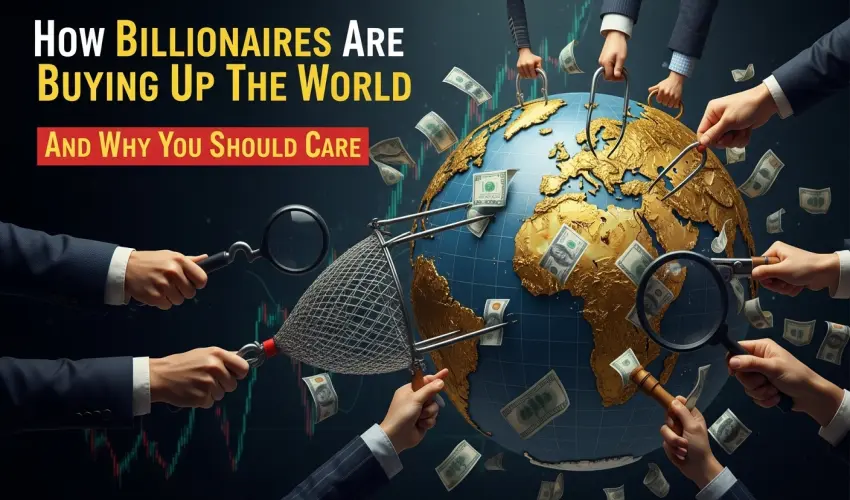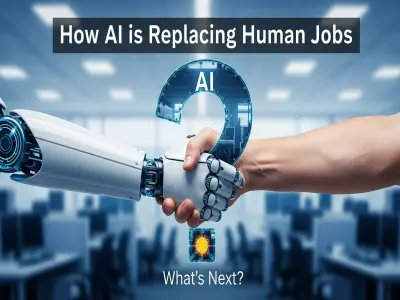How Billionaires Are Buying Up The World (And Why You Should Care)
Published Apr 20, 2025
1 0
Key Takeaways
-
Billionaires are increasingly buying up real estate, media, tech, and natural resources at an alarming rate.
-
Their growing influence threatens democracy, freedom of information, and economic fairness.
-
Rising inequality driven by this trend is destabilizing societies globally.
-
Policy reforms and grassroots movements are essential to reclaim balance.
-
Everyone has a role to play in resisting the unchecked concentration of wealth and power.
Introduction
Once celebrated as icons of innovation and hard work, billionaires are now under growing scrutiny. Why? Because they're not just getting richer; they're increasingly buying up the world we all live in. From housing markets and media outlets to political influence and even natural resources, the ultra-wealthy are accumulating more than just yachts and mansions. They're accumulating power. And that matters a lot more than most people realize.
The Explosive Growth of Billionaire Wealth
In the last decade, billionaire wealth has skyrocketed at an astonishing rate.
-
According to Oxfam, the world’s richest 1% own more than 50% of global wealth.
-
During the COVID-19 pandemic, billionaires' fortunes collectively grew by over $5 trillion, even as millions lost jobs and homes.
-
Economic crises that devastate average families often only make the rich richer, allowing them to swoop in and snap up distressed assets at bargain prices.
Where Are Billionaires Investing Their Money?
They’re not hoarding cash; they're investing strategically in areas that deepen their wealth and consolidate their power:
-
Real Estate: Luxury condos, vast farmlands, and downtown skyscrapers. They're pushing property prices up in major cities, making affordable housing a distant dream for regular people.
-
Media Companies: From Jeff Bezos buying The Washington Post to Elon Musk purchasing Twitter (now X), billionaires recognize that controlling the narrative is as valuable as controlling assets.
-
Technology Startups: Investments in AI, cybersecurity, biotech, and blockchain aren’t just about profit; they’re about shaping the future.
-
Natural Resources: More billionaires are buying up farmland, water rights, and mines, securing control over the essentials of life itself.
Buying Political Power: How Money Shapes Policy
Money talks, and in the political arena, billionaires are shouting. Through millions in campaign donations, funding for super PACs, and armies of lobbyists, they ensure that policies on taxes, regulation, and labor favor their interests. This legal, polished form of influence peddling fundamentally shapes the laws we all live under.
Billionaires and Real Estate: Controlling Our Cities
Urban centers are turning into billionaire playgrounds. Billionaires buy up entire city blocks, sometimes letting properties sit empty while their value soars. This is great for their portfolios but disastrous for residents facing rising rents, gentrification, and homelessness. When housing is treated as a speculative asset rather than a basic human need, ordinary families lose.
Media Ownership and Information Control
When a handful of ultra-wealthy individuals control major media outlets, freedom of information suffers.
-
Bias and Censorship: News stories critical of billionaire interests can be quietly shelved or downplayed.
-
Agenda Setting: The media shapes public opinion, often aligning with the owner's political and economic goals.
When fewer voices control more of the information we consume, democracy itself weakens.
Natural Resources and the Food Supply
Billionaires aren’t just investing in tech and media; they’re buying up the things we need to survive:
-
Farmland: Bill Gates is now the largest private owner of farmland in the U.S.
-
Water Rights: Private companies are securing control over water resources in drought-prone areas.
These moves could allow a few individuals to control critical, life-sustaining resources with little to no public oversight.
The Threat to Democracy and Society
The consequences of this trend are far-reaching and severe.
Economic Inequality: The Widening Gap
The wealth gap isn’t just growing; it’s exploding. In many countries, the middle class is shrinking while billionaires get richer. This threatens social cohesion, political stability, and economic resilience.
A Weakened Democracy
Concentrated wealth concentrates power. When billionaires can fund political campaigns and shape media narratives, the "will of the people" is replaced by the "will of the wealthy." This is no longer a democracy; it's a plutocracy.
Why You Should Care
This isn't just high-level economics; it affects you directly:
-
Higher Living Costs: As billionaires buy up real estate, your rent and mortgage payments rise.
-
Loss of Free Speech: When media outlets cater to billionaire interests, your access to unbiased information shrinks.
-
Shrinking Opportunities: Economic policies favoring the wealthy widen the gap, choking off social mobility for everyone else.
What Can Be Done?
Change is possible, but it requires collective action.
Policy Solutions
-
Wealth Taxes: Progressive taxation could help redistribute extreme concentrations of wealth.
-
Stronger Antitrust Laws: Breaking up monopolistic companies can restore fair competition.
-
Campaign Finance Reform: Limiting corporate and private donations would make politics more democratic.
Grassroots Movements and Local Action
-
Support independent, local journalism.
-
Advocate for tenant protections and affordable housing policies.
-
Organize and vote for candidates who prioritize people over profits.
Conclusion
The trend of billionaires buying up the world is alarming, but it’s not inevitable. Awareness is the first step; action must follow. If we want a future where opportunity, information, and resources are shared more fairly, we must challenge the structures that allow wealth to dominate so completely.
Because in the end, a world owned by billionaires is a world where freedom belongs only to the highest bidder.








